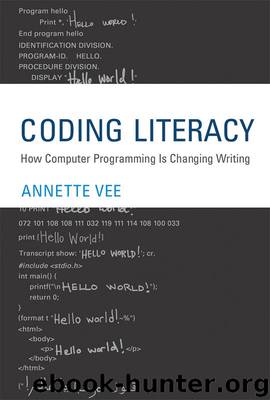Coding Literacy: How Computer Programming is Changing Writing (Software Studies) by Annette Vee

Author:Annette Vee [Vee, Annette]
Language: eng
Format: azw3
Tags: rhetoric, code, history of writing, communication, education, textual, digital humanities, computer literacy, culture, history of computing, new media, teaching, literacy, history
Publisher: The MIT Press
Published: 2017-07-21T04:00:00+00:00
3
Material Infrastructures of Writing and Programming
Historical studies of other technologies are important not so that historical analogies can be made, but because without such historical analyses, we cannot truly understand the nature and shape of current technologies.
—Christina Haas1
During the eleventh through thirteenth centuries in England, writing evolved from an occasional tool into a highly useful and infrastructural practice for the communication and recording of information. For thousands of years prior, writing had helped to record commerce and maintain redistributive economies, though it had a niche status and its importance fluctuated with vicissitudes in governance and trade.2 But after the thirteenth century, writing in England never again waned in its central role in communication and recording of information—the power of writing “stuck.”3 Centralized government initiated this transition, but once writing began building bureaucracy, it also rippled out to restructure commerce and then individual and family life. In this process, fundamental concepts of memory, identity, and information shifted to accommodate the fact that knowledge could exist externally to individuals, travel without human proxies, and be preserved for posterity.4 As the technology of writing transitioned from rare to common, scribes acquired a special status apart from other craftspeople. Whether or not people could read or write—and most couldn’t for at least another 500 years—they saw writing infiltrate many of their everyday transactions and activities. As literacy historian Brian Stock argues, people “began to live texts.”5
In a similar way, computer programming appears to have “stuck” in twentieth-century American society. Although the roots of computational devices extend back further, once code-controlled digital computers were widely adopted as information-processing tools by government offices and large corporations in the 1950s, code and the computational devices used to process it became increasingly infrastructural to business, bureaucratic transactions, and social practices of life in the West. Writing remade institutions and individual lives as it became infrastructural to medieval government, commerce, and social relations, and computer programming is restructuring our lives now. We e-mail each other and pay our bills online; our health, employment, marriage, credit, and tax records are recorded in computerized databases; we rely on computational algorithms to filter our news and purchases; and our free time and relationships are shaped by software such as Facebook, Twitter, Match.com, Yelp, and TripAdvisor. In developed nations such as the United States, code increasingly supports our information and communication infrastructure. As computational devices become more portable and more deeply embedded in our physical surroundings and as more spheres are subjected to computation—consumer buying habits, facial recognition, employee performance evaluations, and national security infrastructure and surveillance—we are increasingly controlled and defined by the computation enacted through computer programming. Historian Michael Mahoney writes, “From the early 1950s down to the present, various communities of computing have translated large portions of our world—our experience of it and our interaction with it—into computational models to be enacted on computers, not only the computers that we encounter directly but also the computers that we have embedded in the objects around us to make them ‘intelligent.’”6 Via
Download
This site does not store any files on its server. We only index and link to content provided by other sites. Please contact the content providers to delete copyright contents if any and email us, we'll remove relevant links or contents immediately.
| Anthropology | Archaeology |
| Philosophy | Politics & Government |
| Social Sciences | Sociology |
| Women's Studies |
Cecilia; Or, Memoirs of an Heiress — Volume 1 by Fanny Burney(31998)
Cecilia; Or, Memoirs of an Heiress — Volume 3 by Fanny Burney(31423)
Cecilia; Or, Memoirs of an Heiress — Volume 2 by Fanny Burney(31369)
The Great Music City by Andrea Baker(30618)
We're Going to Need More Wine by Gabrielle Union(18576)
All the Missing Girls by Megan Miranda(14503)
Pimp by Iceberg Slim(13689)
Bombshells: Glamour Girls of a Lifetime by Sullivan Steve(13641)
Fifty Shades Freed by E L James(12868)
Talking to Strangers by Malcolm Gladwell(12779)
Norse Mythology by Gaiman Neil(12723)
For the Love of Europe by Rick Steves(11195)
Crazy Rich Asians by Kevin Kwan(8841)
Mindhunter: Inside the FBI's Elite Serial Crime Unit by John E. Douglas & Mark Olshaker(8633)
The Lost Art of Listening by Michael P. Nichols(7093)
Enlightenment Now: The Case for Reason, Science, Humanism, and Progress by Steven Pinker(6837)
The Four Agreements by Don Miguel Ruiz(6264)
Bad Blood by John Carreyrou(6243)
Weapons of Math Destruction by Cathy O'Neil(5775)
